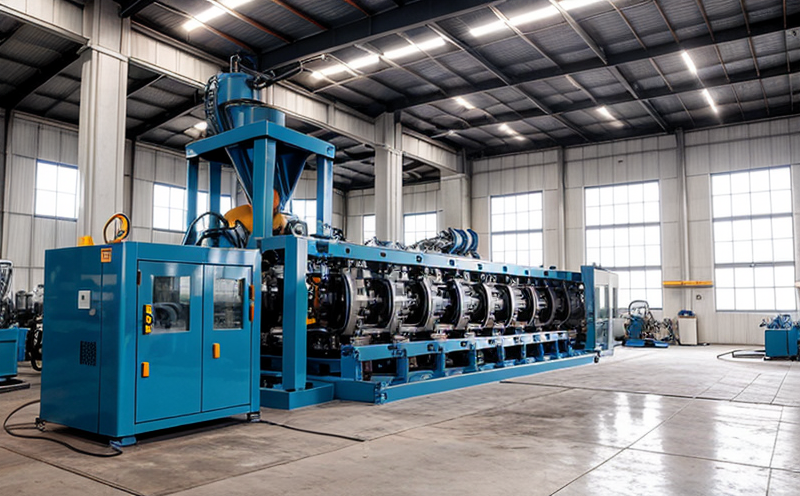ISO 3823 Cutting Machine Performance Testing
The ISO 3823 standard provides a comprehensive framework for assessing the performance of cutting machines. This testing is essential in industrial manufacturing and processing, ensuring that machinery operates efficiently and consistently over time. The test parameters are designed to evaluate various aspects of machine performance, including accuracy, repeatability, speed, power consumption, and energy efficiency.
Cutting machines play a crucial role in the fabrication industry, where precision and reliability are paramount. By adhering to ISO 3823 standards, manufacturers can ensure that their cutting machines meet international quality benchmarks. This standard is widely recognized and accepted across industries, providing a consistent method for evaluating machine performance.
The testing process involves several key steps, each designed to assess different aspects of the cutting machine's performance:
- Setup: The machine is configured according to the ISO 3823 specifications. This includes setting up the cutting parameters such as speed, feed rate, and tool geometry.
- Calibration: The machine is calibrated using standard test specimens. These specimens are designed to simulate real-world materials that the machine will encounter during production.
- Performance Testing: The machine undergoes a series of tests to evaluate its performance under different conditions. This includes testing at various speeds and feeds, as well as evaluating the accuracy and repeatability of cuts.
- Data Collection: During the test, data is collected on key performance indicators such as cut quality, material deformation, energy consumption, and cycle time.
- Analysis: The collected data is analyzed to determine how well the machine meets the ISO 3823 standards. Any deviations from the specified tolerances are noted for further investigation or corrective action.
The results of this testing can be used by quality managers, compliance officers, and R&D engineers to ensure that cutting machines meet international standards. This not only enhances product quality but also improves operational efficiency and reduces downtime.
For procurement teams, ISO 3823 performance testing ensures that the machines they purchase are reliable and capable of meeting production demands. By adhering to this standard, manufacturers can gain a competitive edge in the global market, ensuring consistent performance across their entire fleet of cutting machines.
Why It Matters
The importance of ISO 3823 cutting machine performance testing cannot be overstated. In industrial manufacturing and processing, precision and reliability are critical to the success of any operation. By adhering to this standard, manufacturers can ensure that their machines consistently produce high-quality cuts, which is essential for maintaining product integrity and meeting customer expectations.
One of the primary benefits of ISO 3823 testing is its focus on repeatability. This ensures that each cut made by the machine is consistent with previous cuts. This consistency is crucial in industries where precision is paramount, such as aerospace, automotive, and medical device manufacturing. It also helps to minimize material waste and ensure efficient use of resources.
Another key benefit is energy efficiency. By testing for energy consumption during cutting operations, manufacturers can identify areas where improvements can be made. This not only reduces operational costs but also contributes to sustainability efforts by minimizing the environmental impact of production processes.
- Economic Benefits: Reduced downtime and increased productivity lead to significant cost savings.
- Customer Satisfaction: Consistent quality ensures that customers receive products they can trust.
- Sustainability: Energy-efficient machines contribute to a greener production process.
In summary, ISO 3823 cutting machine performance testing is essential for maintaining high-quality standards in industrial manufacturing and processing. It ensures consistent product quality, reduces operational costs, and contributes to sustainability efforts.
Quality and Reliability Assurance
The ISO 3823 cutting machine performance test is a critical tool for ensuring the reliability and quality of machinery used in industrial manufacturing processes. This testing ensures that machines meet international standards, thereby enhancing product consistency and reducing defects.
- Test Parameters: The standard specifies detailed parameters such as speed, feed rate, and tool geometry to ensure accurate cutting performance.
- Data Collection: Extensive data is collected during the testing process, including cut quality, material deformation, energy consumption, and cycle time. This data provides a comprehensive view of machine performance.
- Analysis: The collected data is analyzed to ensure that all performance metrics meet the specified tolerances. Any deviations are identified for corrective action.
The testing process also helps manufacturers identify potential areas for improvement in their machinery. By pinpointing inefficiencies or inconsistencies, companies can make targeted improvements, leading to enhanced machine performance and reduced operational costs.
Regular ISO 3823 testing ensures that cutting machines are consistently reliable over time. This reliability is essential for maintaining high-quality production processes and meeting customer expectations. In industries where precision is critical, such as aerospace and medical device manufacturing, the importance of consistent machine performance cannot be overstated.
Competitive Advantage and Market Impact
The ISO 3823 cutting machine performance test provides a significant competitive advantage in the global market. By ensuring that machines meet international standards, manufacturers can position themselves as leaders in quality and reliability.
- International Recognition: Adhering to ISO standards ensures that machinery meets international quality benchmarks, which is increasingly important for companies operating globally.
- Customer Trust: Consistent high-quality performance builds trust with customers, leading to long-term relationships and repeat business.
- Sustainability: Energy-efficient machines contribute to a greener production process, aligning with growing sustainability trends in the industry.
In addition to these benefits, ISO 3823 testing can also help manufacturers differentiate themselves from competitors. By demonstrating a commitment to quality and reliability through adherence to international standards, companies can attract customers looking for high-quality products and services.
The impact of ISO 3823 performance testing extends beyond individual companies. It contributes to the overall advancement of industrial manufacturing processes by setting a global standard for machine performance. This helps to ensure that cutting machines are consistently reliable across industries, leading to improved efficiency and productivity in manufacturing operations worldwide.





